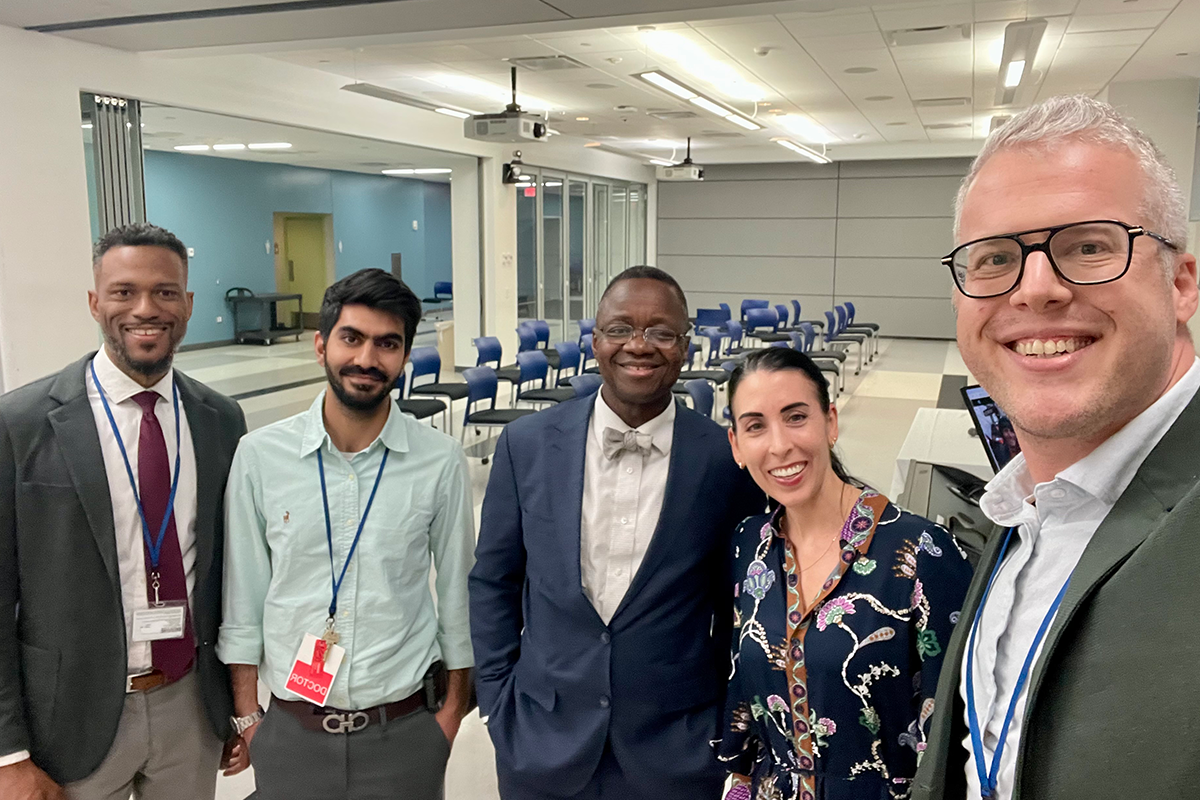Fighting for Life in a System Built for Caution
By Office of the President | Jun 3, 2025

From Left to Right: W. Marcus Lambert, Ph.D.; Shahzaib Khan, M.D.; Moro O. Salifu, M.D., Holly Fernandez Lynch, JD, MBE; and Tom Wallach, M.D.
A recent deep personal conversation at Downstate was sparked by loss, driven by science, and rooted in the urgent need to rethink how we regulate hope. The discussion centered on For Love and Life: No Ordinary Campaign. This documentary follows Brian Wallach’s journey after his ALS diagnosis at age 37. Alongside Sandra, his wife, Brian turned heartbreak into advocacy, launching a national movement to challenge a healthcare system that too often places processes above people.
The film shares its story and demands change while raising a critical question: When time is short, who decides what risks are worth taking?
That question anchored a compelling panel discussion led by Thomas Wallach, M.D., Brian’s brother and Research Director in Pediatric Gastroenterology. Joining him were Holly Fernandez Lynch, J.D., M.B.E., Associate Professor of Medical Ethics and Health Policy at the University of Pennsylvania; W. Marcus Lambert, Ph.D., Associate Vice President for Research; and Moro O. Salifu, M.D., Chair of Medicine. Together, they brought faculty, students, and researchers into a candid conversation about medicine, ethics, and what comes next.
Professor Lynch opened with a sharp reminder: modern drug regulation is relatively new and born from tragedy. In the 1930s, a toxic elixir killed more than 100 people. In the 1960s, thalidomide caused congenital disabilities in thousands of children. Those disasters led to laws requiring drugs to be safe and effective before reaching the public. These rules saved lives. However, as science advances at unprecedented speed, the system designed to protect patients struggles to keep up.
Patients with terminal illnesses often want to try anything that might help, even if the risks are uncertain. Regulators, however, must think beyond the immediate moment. They are responsible for protecting lives today and in the future. The FDA’s role goes beyond approving treatments. It protects public trust and ensures medical decisions are grounded in evidence and less so in hope. It also means having the courage to say, “Not yet.”
Access to unapproved drugs exists, but the paths are complex. Lynch outlined three main options—each with benefits and risks:
- Expanded Access, or “Compassionate Use,” allows patients to try investigational drugs under strict guidelines.
- Accelerated Approval offers earlier access based on indirect signs of effectiveness but requires confirmatory studies.
- Right to Try bypasses FDA oversight entirely but often leaves patients without insurance coverage or medical support.
Courts have repeatedly affirmed the FDA’s authority. In landmark cases like Rutherford and Abigail Alliance, judges ruled that there is no constitutional right to unapproved treatments, even in cases of severe illness.
Recent approvals brought the stakes into sharp focus. Aducanumab, developed for Alzheimer’s, received FDA approval despite failed trials, leading to public backlash and restricted Medicare coverage. AMX0035, an ALS treatment, was approved after a small trial and strong advocacy but later withdrawn when a larger trial failed. Tofersen, another ALS drug, did not meet its primary goal but showed promise in biomarkers and gained patient support. A gene therapy for Duchenne muscular dystrophy added to the debate, raising concerns about cost and uncertain outcomes.
These cases exposed a system attempting to balance speed with safety, though not always consistently. Cancer drugs often move quickly through the pipeline. Neurological treatments face more barriers. Many physicians remain unaware of expanded access programs. And the FDA continues to apply the same standards, whether a condition is mild or life-threatening.
The cost adds another layer of pressure. Accelerated approvals can cost billions, often covered by Medicare and Medicaid, long before the drug’s benefits are confirmed. In rare diseases where treatments are costly, this raises questions about fairness and sustainability.
The system needs more innovative reforms. Doctors need better training on access pathways. The FDA must apply standards more consistently. Drug companies should be accountable when they do not complete required follow-up studies. The solution is not weaker oversight; it is regulation that is sharper, clearer, and better prepared to meet today’s challenges.
We owe it to act with care for today’s patients and urgency for tomorrow’s patients.
Watch the full panel discussion: Drawing the Line – Dr. Fernandez Lynch et al.
Learn more about Brian Wallach and how President Obama supports his fight
Tags: Research